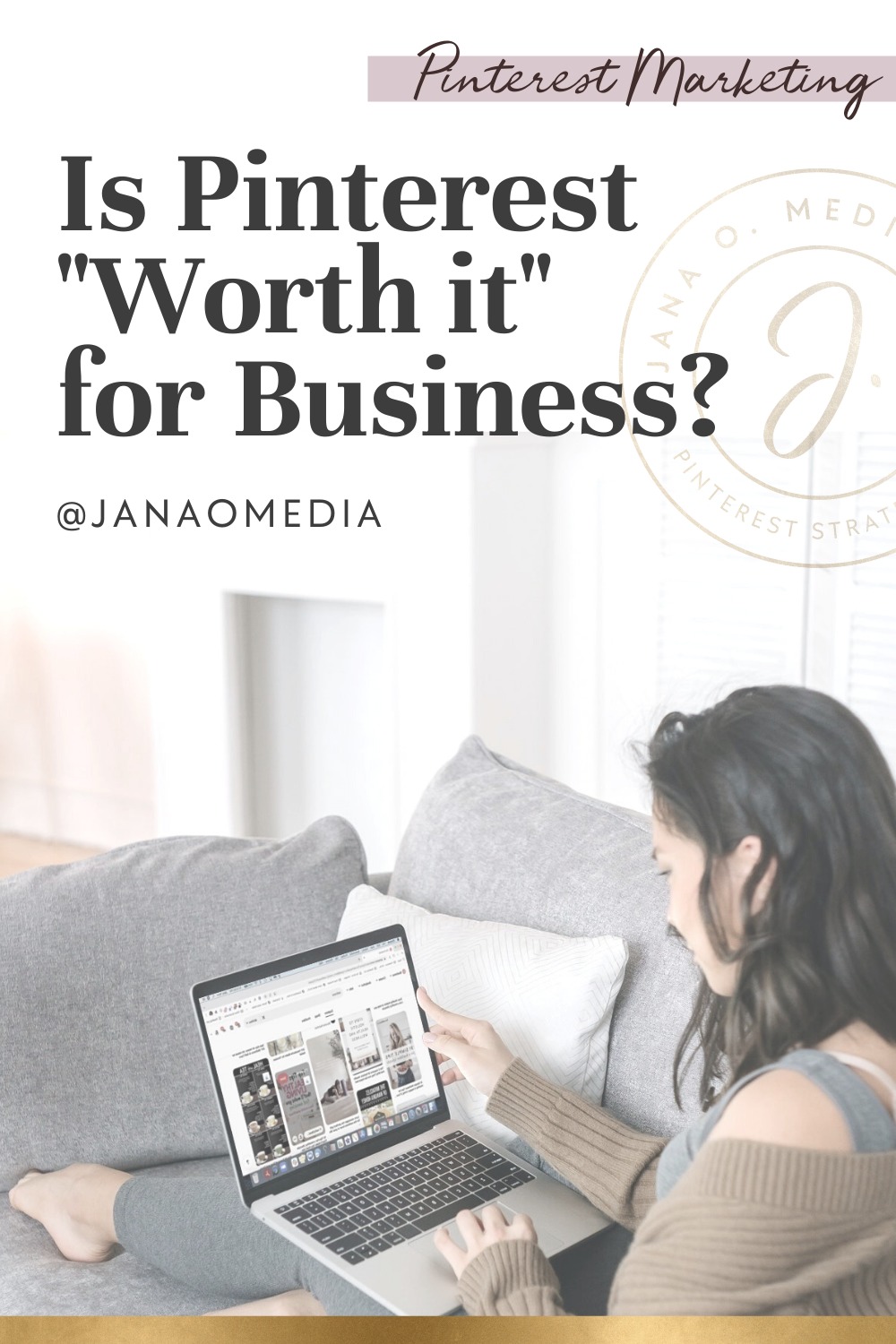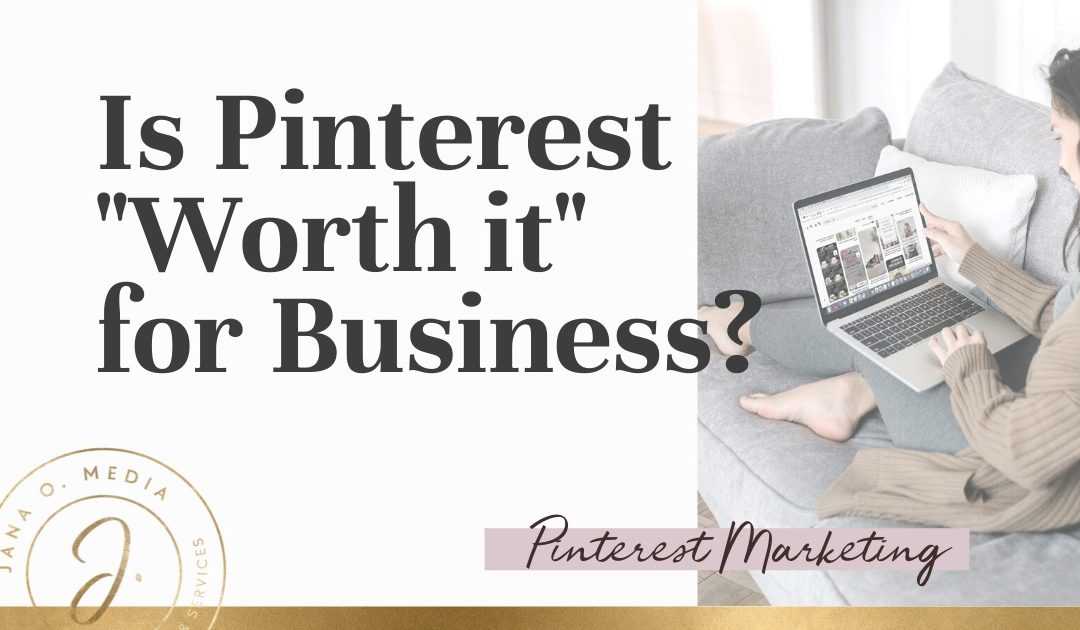Is Pinterest worth it for business? Have you been wondering this?
Well, you’ve landed in the right place – especially if you’re running a service-based business.
In this post, I will be sharing with you my thoughts around this. Plus I’d like to give you some new ways to think about and evaluate Pinterest’s ROI.
These insights will be helpful regardless of what type of business you’re marketing (product-based, service-based, content creators, affiliate marketers) … But I think it will be especially helpful for the coaches, consultants, and service providers who are considering or evaluating Pinterest marketing.
Before we jump in though, I want to check in with you on something. And you’ll have to bear with me, because this may seem like a random question, but… Are you a football fan? College ball? NFL? (I’m an NFL fan. Patriots. Don’t hate me. 🤣)
The reason I ask? I’m going to be making a football analogy in a bit. But if you’re not a fan, no worries. I’ll be sure to describe it in a way make sense regardless.
But meanwhile, back to the question at hand… In this post, I’ll be covering:
(You can click to skip to any of these sections!)
Ready? Let’s get into it…
Is Pinterest marketing worth it – for coaches and service-based businesses?
The fact is that this question confuses a lot of people. Here’s why…
Most service-based entrepreneurs measure the ROI of their visibility efforts by asking, “Is this platform bringing me clients?” And that is the right question – but the answer may be more nuanced than it appears at first. Let me explain…
From time to time, a coach or service pro who follows my Pinterest marketing strategies and tactics (meaning that she took and implemented my course or hired me to set her Pinterest plan up) says something like this:
“Jana, when I get on a discovery call with a new potential client, I always ask, ‘How did you find me?’ And none of them say they found me on Pinterest! So I don’t think Pinterest is working for me!”
When that comes up, I have to remind those clients / students that Pinterest is different from the other marketing channels they may be using.
It’s a search engine; it is not social media. So we need to approach it differently – and we need to evaluate it differently, too.
As Pinterest marketers, our goal is to use the platform to bring *new* ideal client types right to our digital doorsteps. And by *new*… I mean people who are already searching for what we offer and help with. And they don’t already know us yet – and don’t yet know about the solutions we offer.
Let’s look at an example:
- A health coach specializes in helping women get better sleep.
- She creates a pin about “10-Minute Pre-Bedtime Yoga Routine for Better Sleep.”
- On Pinterest, someone searches for “better sleep ideas” or even “bedtime yoga.”
- Our sleep coach’s pin is served up to that Pinner. The pinner has just discovered this coach and her tips / ideas / content!
Make sense? Great. Now… What happens next?
To understand if Pinterest is worth it for business, understand your funnel (or customer journey) – and where Pinterest fits in.
Your customer journey – or some call it a “funnel” – is a series of steps that your potential clients take. It’s like a path of stepping stones that you’ve intentionally laid out for them – and your content leads them down that path.
(Psssst… Some people bristle at the word “funnel,” but everyone has one – whether you like it or not! 🤷🏻♀️ It could be a formal funnel that’s you’ve intentionally created and tested… Or it could be more informal. But if you’re getting discovered by clients, and offering them steps to take to move closer to hiring you – you’ve got a funnel!)
Funnels come in all shapes and sizes, and every one is different. But here’s one example of what the steps could look like – for a coach, consultant, or service provider.
- A pinner sees a pin of yours on Pinterest. (Maybe it’s about that bedtime yoga routine for better sleep!) This pin happens to be an idea pin – and the value is right there in the pin.
- The idea pin catches her eye, and she interacts with it. She makes it bigger, and watches it. Maybe this evening, she tries a few of the poses you suggested.
- The next time she refreshes her Pinterest smart feed, she finds more of your static pins in her feed.
- One of those pins leads her to a blog post, a podcast episode, or a YouTube video that you have created – about the benefits of yoga at bedtime.
- From that blog post, she clicks over to another blog. (It is good practice to interlink blogs for SEO and user experience.)
- From the second blog post, she ends up opting into your email list – to access a free checklist, webinar – or some other lead magnet.
- She starts to receive emails from you.
- Perhaps in that third email you send, your main call to action is to join your Facebook group – and she does. (This step could also be a weekly Clubhouse room… or other hub.)
- Now she’s in your Facebook group. She binges on some FB Livestreams you’ve created in the past. (Or listens to replays on Clubhouse…)
- About two months after she joins your group, she’s been consuming your regular value posts, and she feels comfortable enough (because of your “nurture” content) to book a discovery call with you!
- She hits your Calendly and books that call! Yay!
Okay, now… back to the “How did you hear about me?” question… When you ask her on the discovery call, what is her answer going to be? Does she say, “I found you on Pinterest?” Probably not.
Many of my clients and students report that their people answer this question with:
- “I’m on your email list!” … or
- “I’m in your Facebook group…” or
- “I love and got so much value from your Facebook lives…”
But here’s the thing:
She actually found you originally on Pinterest – because she searched for “bedtime yoga.” And, if she hadn’t found your Idea pin, she wouldn’t be in your Facebook group – or on your email list. She still wouldn’t know about you and your offers.
Got it? Okay, cool. Now, for that fun football analogy I promised at the verrrrryyyyyy beginning of this post. Ready? Read on for it…
(You can 📌 pin this article for reference to your “Pinterest marketing” or “Getting Clients” board:)

Question: Is it “worth it” to pay the salary of a “Center” on a football team?
On a football team, the “Center” is the offensive player who passes (or “snaps”) the ball between his legs to the quarterback at the start of each play.
Sometimes, the Quarterback will then pass the ball off to a running back – who might run the ball into the end zone. Other times, the QB will throw the ball to a tight-end or a wide receiver – and he might advance the ball or even score a touchdown.
Occasionally, we’ll even see a “trick play” (So fun!!!) in which the QB hands off to a running back, who then throws the ball “laterally” to another receiver… And that last player scores the points. (And the crowd goes wild!)
So, as you know (or can imagine 😉)… Quarterbacks, wide receivers, tight ends, running backs… They usually score the most points in football. (Kickers, too. But I’ll keep this analogy simple.)
The Center doesn’t typically score many points – in any game, season – or even in his entire football career.
So does a coach or general manager evaluate the Center’s performance based on how many points he scores? Are they going to cut him from the team? Or stop seeing his salary as an important investment – if he hasn’t scored any points all season? (Or ever?)
Probably not.
Football teams need Centers. (In fact, a lot of analysts call it one of the hardest and most critical roles on the team… but I digress. 🤓)
So, I encourage you to think about your Pinterest marketing a little bit like that Center position. We are counting on him as much as any other position on the team to set things up.
Pinterest might not appear to be the top scoring player – but it would be pretty hard for the other players to score points without him. (Remember those answers to the “How did you hear about me” question?)
Pinterest – like that Center – is an important part in your client acquisition game plan – and it’s worth the investment.
(This could certainly also be said for other channels or strategies – like Google SEO as an example – where the the main goal is bringing people in at the “top of the funnel” – people who are ideal clients types and *new* to you.)
Okay, thanks for indulging my love of football. Now…
Final Thoughts on Measuring Whether Pinterest Is Worth it for Your Business…
When you ask your clients (or discovery call participants) how they heard about you – keep in mind that they may not mention Pinterest… even when you’re investing time and resources into the platform.
Take that with a grain of salt. Remember, they may have ended up in your Facebook group, Clubhouse rooms, IG lives because of Pinterest… Because they may have initially discovered you when searching Pinterest for the things you coach, teach, and help with.
Understand the role that Pinterest plays in your “funnel” or “customer journey – and you’ll be able to better understand if Pinterest is worth it for business.
Ready to use Pinterest to get clients for your business?
Are you an online coach or service provider? And you want to learn how to set up a Pinterest account that will grow your audience and attract clients — on autopilot?
If so, then my course Pinterest with a Purpose was created for you!
It’s a self-study e-course that walks you through *every step* of setting up your strategy and your account. It reveals the methods I perfected over YEARS doing strategic Pinterest set-ups for clients!



